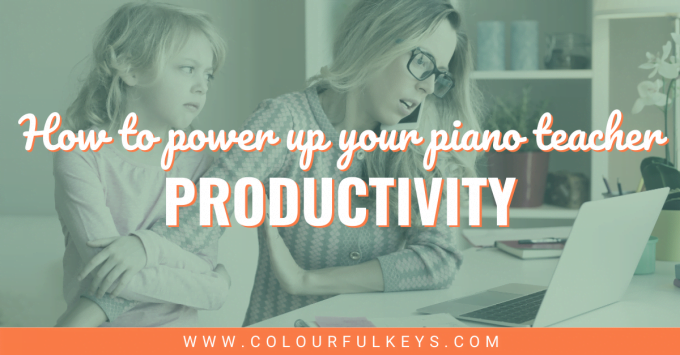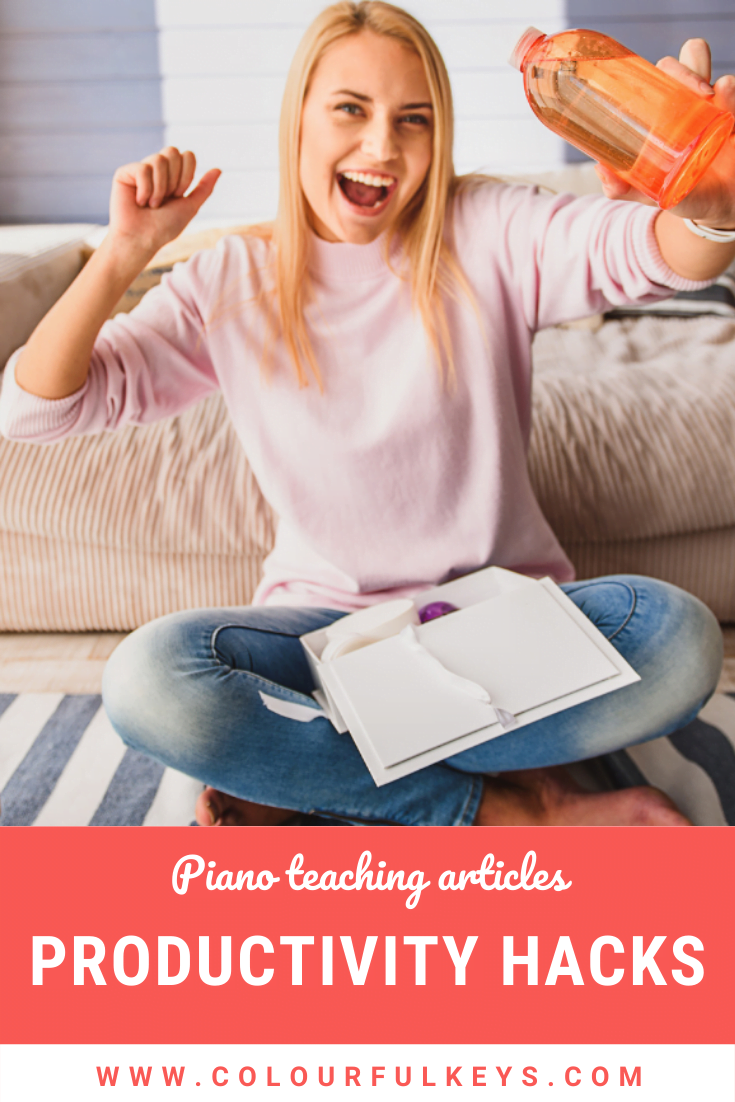Increasing your piano teacher productivity could allow you to make more money, spend more quality time with family or get some much needed rest. That’s the dream anyway.
But how do we go about improving our productivity and efficiency? How do we make a real difference instead of just following the latest fad or trend?

⬆️ Listen to the podcast above or keep on reading, whichever fits your style. ↙️
You’ve seen the Facebook posts and Instagram stories and click-bait articles. They flog the greatest productivity hacks. They claim to have found the secret which all successful people share.
It’s bogus of course.
There is no secret.
But when you think about it, all these posts do reveal something interesting about productivity. I started to see piano teacher productivity differently when I realised why there were so many productivity hacks out there.
It’s not because they’re lying (in most cases, anyway). It’s because there is no single correct answer for all people.
You shouldn’t be looking for the right answer. You should be looking for the right answer for YOU for right now.
The Piano Teacher Productivity Solution
The way you know what’s right for you right now – the solution to it all – is to test.
You need to become a self-experimenter.
That might sound a little sinister or creepy. But the reason I want you to see it through the lens of science is so that you can remove the emotion from it all.
In our modern culture, our productivity seems to have become intertwined with our self-worth. Many of us have internalised this idea that moving quickly somehow makes us a better person.
And, inevitably, this leads to feelings of inadequacy when we can’t do all the things.

Because we can’t do all the things. None of us are magical creatures.
(Unless you are??? Seriously, if Hogwarts is real you need to tell me. I’m going to be so mad if you don’t let me in on the secret!)
How to Conduct Piano Teacher Productivity Experiments
Piano teacher productivity experiments should be conducted in 3 stages:
- Prepare
- Experiment
- Evaluate
I recommend splitting yourself into 2 different roles during the experiment: the subject and the observer. The observer takes the notes throughout the experiment. The subject’s only job is to follow the experiment to the letter.
Step 1: Prepare
In this phase you need to decide on your objective or predicted outcome, the parameters, and when you will conduct the experiment.
For example, if you were testing the Pomodoro Technique, you might decide to try it once a day for one week from Monday the 7th to Sunday the 13th and set a reminder on your phone for the planned period of the pomodoro. Your objective could be to get down to “inbox zero” each day without leaving any messages in the starred folder for later.
Step 2: Experiment
In stage 2, you run the experiment. This means that you cannot change the objectives or parameters!

Once the experiment begins you must stick to your plan and record the results as you go.
Step 3: Evaluate
The evaluate phase is when you get to think about changes. Was the experiment a success? Will you run it again with a different structure or a tweak?
Experiment Example: Pomodoro Technique
Let’s take an example experiment to bring these 3 stages into focus. Imagine you’ve heard about the pomodoro technique for improving focus and you want to give it a go.
Pomodoro Technique Step 1: Prepare
First, you’ll need to research the pomodoro technique to find out what works for other people.
The basic idea of this hack is to set timers for working and break time at regular intervals. During your research, you discover that the most common breakdown is 25 minutes of work followed by 5-minute breaks, so you decide to start with that.
You find this tomato timer and decide that you will use it for 3 back-to-back sessions each morning for 5 days. The question you’re trying to answer in this experiment is whether you get more items off your to-do list this week than you usually do.
Pomodoro Technique Step 2: Experiment
For 5 days you use the tomato timer 3 times each morning. You record your observations and what you got done in a notebook at the end of the 3 sessions each day.

Pomodoro Technique Step 3: Evaluate
After the 5 days are up, you look back over your notes and discover that you did get more done overall. However, you got the most work done in the first session each day which indicates that you were still losing focus throughout the morning, bit-by-bit.
You decide to re-run the experiment with a slightly longer break of 10 minutes between 25-minute work sessions to see if this improves productivity further.
Conduct Your First Piano Teacher Productivity Experiment
The next time you see an interesting looking productivity hack or idea, put away the scattergun – instead, plan and execute an experiment.
You might learn a new way to become more productive…but you’ll definitely learn something about yourself.
If you need more ideas on improving the business side of your teaching studio, I have an entire page devoted to that very subject. Hop on over to check it out!
